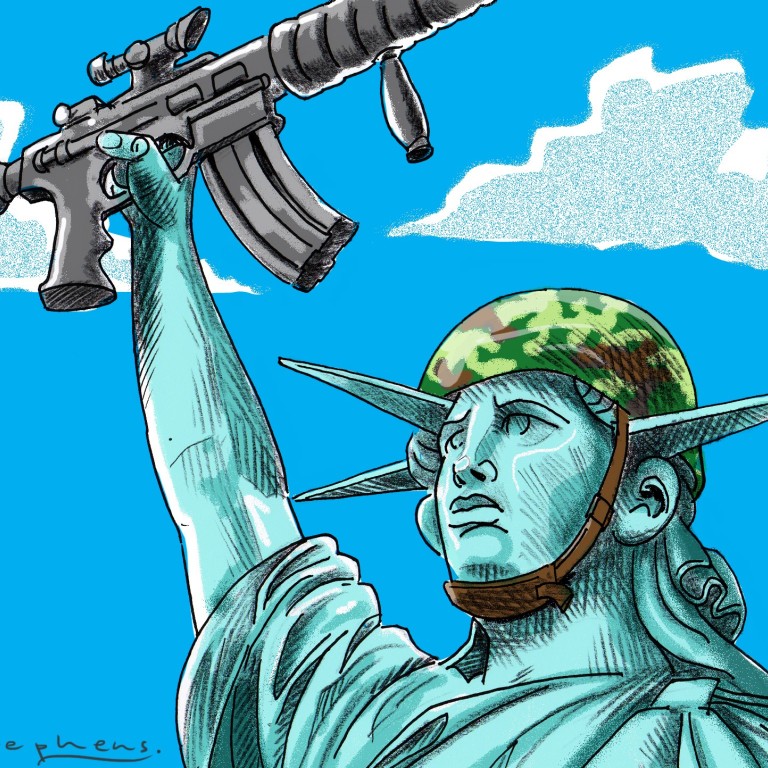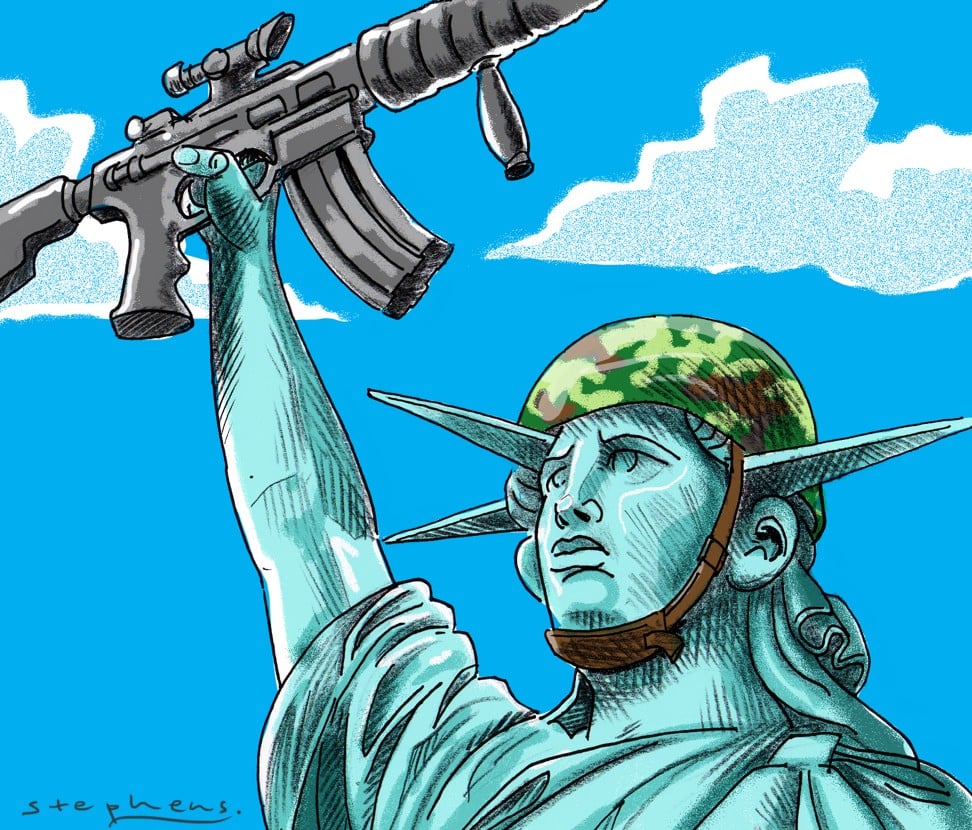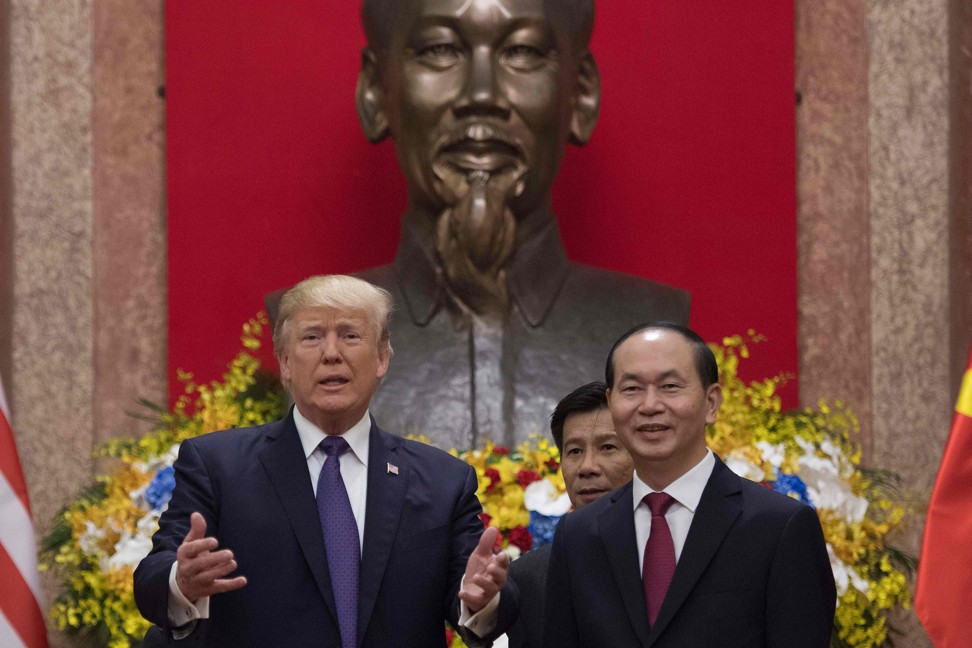
Why fears over a malign China replacing a benign America are a gross distortion of history
Jean-Pierre Lehmann says apprehensions over what future Chinese global leadership would look like should not obscure the fact that historical meddling with other democratically elected governments shows the concept of ‘America as a beacon of freedom’ to be pure propaganda

The signs had been there for some time. In 2012, Financial Times Washington Bureau chief Edward Luce published Time To Start Thinking: America and the Spectre of Decline. The beginning of the end for US leadership can be dated back to two events in 2003: the illegal US invasion of Iraq on March 20 and the collapse of the World Trade Organisation’s ministerial meeting in Cancún on September 14. These events effectively heralded the end of US leadership of a Western-oriented multilateral global order.
Certainly, in the course of his Asia Tour, Trump appears to have been ceding more and more global leadership to China and to President Xi Jinping. To suggest, however, that Pax Americana will be followed by Pax Sinica is misleading. The global circumstances of 2017 are dramatically different from those of 1945. The US and China are very different societies and their respective views of their place in the world differ radically.
President Donald Trump gets an emperor’s welcome in Beijing
Donald Trump congratulates China’s Xi Jinping on ‘extraordinary elevation’
One major error, however, is to assume that, with the eclipse of the US, the world is losing a benign hegemon, to be almost certainly followed by a malign force. Harping on US leadership through “Western values” is to delve in mythology.
America is a nation founded by slaveholders extolling a gospel of freedom
Thus, China is lambasted for not being a democracy and for its failure to respect human rights – deemed a core Western value. The fact is that, in the West, democratisation was a consequence – not a cause – of successful industrialisation. Democracy in the West is a relatively recent phenomenon. The UK is often held up as a model. However, Britain’s rise to wealth and power depended initially on the slave trade and subsequently on colonisation.
American historian Sven Beckert’s book, Empire of Cotton: A Global History, demonstrates the close correlation between cotton and Britain, and how its development depended on slavery and colonies.
Thus, while by the 1920s democracy existed for the British in Britain, it was forcefully denied to Britain’s overseas colonial subjects. Those who advocated independence were “dissidents”. Later, Indian prime minister Jawaharlal Nehru was jailed nine times by his British colonial overlords, for a total of 3,259 days. China is harshly criticised for its occupation of Tibet, while in fact Britain invaded in 1904.
‘Dominant’ Xi can use his power in China to be a force for good in the world, says US spy chief
That was then. But how about more recently, especially the decades of Pax Americana?
First, there has always been a considerable degree of hypocritical ambiguity and a stunning degree of historical amnesia in the American self-perception and projection. Thus, the late eminent US historian Richard Hofstadter: “It has been our fate as a nation not to have ideologies, but to be one.” He was referring to “Jeffersonian democracy”, yet Jefferson owned slaves.
Why the US must not cry foul over Moscow’s alleged role in Trump winning the White House
As US writer Ta-Nehisi Coates has pointed out, America is a nation founded by slaveholders extolling a gospel of freedom, and that its initial wealth was derived from “the ability to employ this slave labour on abundant land stolen from Native Americans”. It is difficult to argue that the US had been anything resembling a “true” democracy until under the administration of Lyndon B. Johnson in the 1960s. Even then, it has retained many imperfections, especially due to what would seem to be sentiments of nationally visceral white supremacy, which Coates deems “the scourge of American history”. The concept of “America as a beacon of freedom” does not necessarily compare favourably with some of the Soviet Union’s most blatant propaganda.
Ghosts of Vietnam war stir as Senator John McCain takes aim at US President Donald Trump
In A Great Place to Have a War: America in Laos, author Joshua Kurlantzick estimates that 10 per cent of the Laotian population was killed, mainly civilians, and 25 per cent were made refugees. Recently released reports indicate that, during the Korean war, numerous and terrible offences were committed by the US military against South Koreans; in Indonesia, the massacre of some 100,000 civilians by the Indonesian army in the mid-1960s was supported by the US, on the grounds that they were “commies”.

Of course, ideologically, Washington supported democracies, but practically this might have depended on how friendly and compliant the democracy was to the US. In 1953, the democratically elected Iranian prime minister, Mohammad Mossadegh, was overthrown in a CIA-orchestrated coup, the consequences of which are still with us. Twenty years later, it was the turn of democratically elected Chilean president Salvador Allende. In 1989, the US invaded Panama and overthrew president Manuel Noriega. The list goes on. Boston professor Lindsey A. O’Rourke estimates that during the cold war, Washington tried to change other governments 72 times, through 66 covert operations and six overt. Unarguably the most deplorable recent example was the illegal invasion by the US (and its ally the UK) of Iraq, unleashing one of the darkest chapters in the history of humanity.
CIA admits it was behind 1953 coup in Iran
Iraq invasion: the defining images
I continue to believe that, given the global circumstances in 1945, Pax Americana was undoubtedly the best option. Having been born in that year, I am grateful to US leadership, especially under Franklin D. Roosevelt. There can also be no doubt that – while the alleged Western values of democracy, with the US as its beacon, is a sham, as is the notion of the US as a benign global hegemon – there have been many and considerable tangible benefits of Pax Americana.
First they came for the Chinese: Trump’s assault on Muslims puts US back 135 years
As the Western powers and Japan rose in the 19th and 20th centuries, China was treated abysmally, from the opium wars to the liberation. There is indeed truth in the perception that it was China’s era of humiliation. So far as the US is concerned, this is egregiously illustrated by the Chinese Exclusion Act (barring Chinese from entering the US), enacted in 1882 and repealed only in December 1943, two years after Pearl Harbour, when China had become an American ally in the war against Japan.
To build a solid future, honest recognition of the past would seem essential. There is ample reason to be somewhat apprehensive of what Chinese global leadership will look like. But drawing a contrast between an allegedly benign US and an allegedly malign China is a gross distortion of history and no way to build a relationship.
Jean-Pierre Lehmann is emeritus professor at IMD, founder of The Evian Group, and visiting professor at the University of Hong Kong

